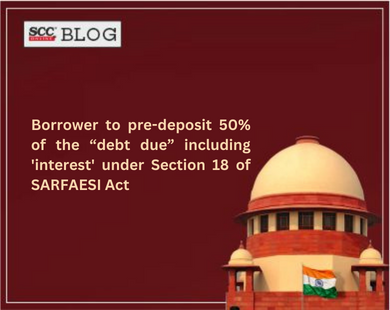Supreme Court: Explaining the scope of Section 18 of the Securitisation and Reconstruction of Financial Assets and Enforcement of Security Interest Act, 2002 (SARFAESI Act), the bench of MR Shah* and BV Nagarathna, JJ has held that under Section 18 of the SARFAESI Act, the borrower has to deposit 50% of the amount of “debt due” as claimed by the bank/financial institution/assignee along with interest as claimed in the notice under Section 13(2) of the SARFAESI Act and the borrower is not entitled to claim adjustment/appropriation of the amount realised by selling the secured properties and deposited by the auction purchaser when the auction sale is also under challenge.
Issues
- Whether, while calculating the amount to be deposited as pre-deposit under Section 18 of the SARFAESI Act, 50% of which amount the borrower is required to deposit as pre-deposit and whether while calculating the amount of “debt due”, the amount deposited by the auction purchaser on purchase of the secured assets is required to be adjusted and/or appropriated towards the amount of pre-deposit to be deposited by the borrower under Section 18 of the SARFAESI Act?
- Whether the “debt due” under Section 18 of the SARFAESI Act would include the liability + interest?
Analysis
At the outset, the Court made clear that as per Section 2(ha) of the SARFAESI Act, “debt” shall have the same meaning assigned to it in clause (g) of Section 2 of the Recovery of Debts and Bankruptcy Act, 1993 (the Act 1993), i.e. any liability inclusive of interest which is claimed as due from any person, by a bank or a financial institution during the course of any business activity undertaken by the bank or the financial institution, in cash or otherwise, whether secured or unsecured, or assigned, or whether payable under a decree or order of any civil court or any arbitration award or otherwise or under a mortgage and subsisting on, and legally recoverable on the date of the application. Hence, “debt” means any liability inclusive of interest.
Coming to the first part of the issue, the Court noticed that as per Section 18 of the SARFAESI Act, any person aggrieved, by any order made by the DRT under Section 17, may prefer an appeal within thirty days to an appellate Tribunal (DRAT) from the date of receipt of the order of DRT. Second proviso to Section 18 provides that no appeal shall be entertained unless the “borrower” has deposited with the Appellate Tribunal 50% of the amount of “debt due” from him, as claimed by the secured creditors or determined by the DRT, whichever is less and only and only then, an appeal under Section 18 of the SARFAESI Act is permissible against the order passed by the DRT under Section 17 of the SARFAESI Act. Under Section 17, the scope of enquiry is limited to the steps taken under Section 13(4) against the secured assets. Therefore, whatever amount is mentioned in the notice under Section 13(2) of the SARFAESI Act, in case steps taken under Section 13(2)/13(4) against the secured assets are under challenge before the DRT will be the ‘debt due’ within the meaning of proviso to Section 18 of the SARFAESI Act.
Hence, in case of challenge to the sale of the secured assets, the amount mentioned in the sale certificate will have to be considered while determining the amount of pre-deposit under Section 18 of the SARFAESI Act. However, in a case where both are under challenge, namely, steps taken under Section 13(4) against the secured assets and also the auction sale of the secured assets, in that case, the “debt due” shall mean any liability (inclusive of interest) which is claimed as due from any person, whichever is higher.
The Court noticed that as per the second proviso to Section 18 of the SARFAESI Act, it is the “borrower” who has preferred an appeal before the Appellate Tribunal and the “borrower” who shall have to deposit 50% of the amount of “debt due” from him, hence, it is not appreciable how the amount deposited by the auction purchaser on purchase of secured assets can be adjusted and/or appropriated towards the amount of pre-deposit, to be deposited by the borrower
The Court concluded that the borrower can take the benefit of the amount received by the creditor in an auction sale only if he unequivocally accepts the sale. In a case, where the borrower also challenges the auction sale and does not accept the same and also challenges the steps taken under Section 13(2)/13(4) of the SARFAESI Act with respect to secured assets, the borrower has to deposit 50% of the amount claimed by the secured creditor along with interest as per section 2(g) of the Act 1993, wherein, “debt” means any liability inclusive of interest which is claimed as due from any person.
[Sidha Neelkanth Paper Industries Private Limited v. Prudent ARC Limited, CIVIL APPEAL NO. 8969 OF 2022, decided on 05.01.2023]







